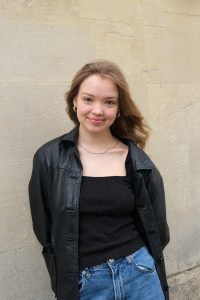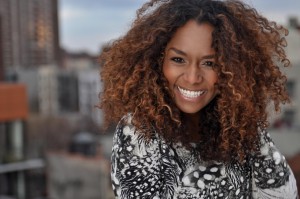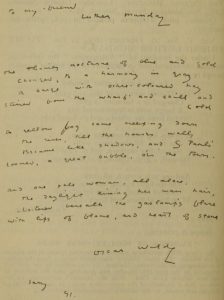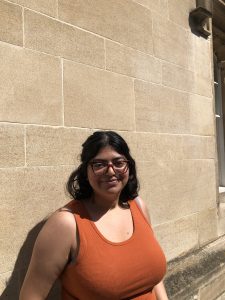
Voices from the Entr’acte
by Maggie Wang | September 18, 2020
“You’re not performing femininity in a way that we can read onstage, so you’re failing at performing this,” says Aiden K. Feltkamp, recalling the rehearsal process for a scene from Rossini’s Barber of Seville. Feltkamp – a transgender non-binary writer based in New York City – trained and performed as a mezzo-soprano before writing libretti. For them, putting on the mask of the stereotypically feminine Rosina – the love interest in Barber – was difficult: “I felt like I couldn’t get into that physical space in the way that I wanted to. [The obstacle] was my own idea of what a very femme person looks like or moves like.” Opera, like many aspects of society, seems to have frustratingly specific classifications of what gender is and how it should be depicted. But Feltkamp is one of several innovators in the opera world who have dedicated their careers to challenging these definitions and making opera more inclusive, authentic, and accessible.
Feltkamp discovered opera when they saw a production of The Marriage of Figaro in their first semester at university. At the time, they were studying cello performance but were “blown away” by Mozart’s drama. What drew them most was the character of Cherubino, a boy in the throes of puberty who disguises himself as a girl so he can be close to the woman of his dreams. Traditionally sung by a woman, this role is at the forefront of discussions about gender in the opera world: “I’d always had ambiguity around my gender growing up,” Feltkamp says, “but I could never really articulate it or explore it, so getting into opera let things ‘click’ a bit more for me.” Still, they often felt confused by the relationship between gender, characterisation, and voice. Some teachers criticized them for not sounding feminine enough, while others praised them for not trying to affect femininity. Eventually, when these conflicts became too much, Feltkamp faced a choice: “Between myself and my voice, I had to choose myself.”
Now, in addition to leading education and diversity initiatives, Feltkamp writes opera libretti. Their first major work The Times Are Nightfall was a sequel to Mozart’s Don Giovanni. It follows Donna Elvira and Donna Anna, two of Giovanni’s scorned lovers, as they recover from the trauma he inflicted upon them. For Feltkamp, writing their love story was a chance to challenge two flaws present in productions of Mozart’s opera. The writer was initially frustrated by many directors’ decisions to “downplay the sexual assault aspect” of the opera and instead portray Giovanni, a notorious libertine, with his own “book of conquests”, as “just a lovable rogue who gets in trouble.” Secondly, Feltkamp was disconcerted by the prevailing taste for portraying Anna, whose father dies while defending her from Giovanni’s attempted rape, as a liar. In opera, Feltkamp notes: “Women’s emotions are often belittled, or they’re called ‘crazy’.” By uniting Anna and Elvira over their shared trauma, they hoped to “resolve” Mozart’s—and the librettist, Lorenzo Da Ponte’s—unresolved depictions of female experiences and “legitimise women’s feelings and emotions […] in a modern way.”
Feltkamp makes a convincing argument for this reinterpretation of Don Giovanni, but, even among those at the forefront of opera’s gender-identity debate, it is not the only reasonable – or successful – reinterpretation. In May 2019, Lucia Lucas became the first female baritone to perform a principal role from the operatic canon in the United States. This was the title role in Don Giovanni, and Lucas remembers her month-long stay with the Tulsa Opera as “a big fever dream.” Lucas, who is one of few transgender opera singers with international recognition, received a substantial amount of media attention, especially given the hyper-masculine nature of the role. Yet, she does not see this contrast of gender identities as anything unusual: “My first week after coming out, I was playing hyper-masculine characters,” she says. “I had lots of performances already scheduled, and I just did those performances.” These experiences with hyper-masculinity have led her to her own unconventional interpretation of Giovanni. “I think Giovanni is somewhat misunderstood,” she says. “It’s not strictly clear where Giovanni stands on everything. It’s up for interpretation whether he’s a womaniser or whether he’s a libertarian.”
Perhaps because of these experiences, Lucas does not characterize her own gender identity as unusual. When asked to introduce herself, she highlights her decade-long professional career in opera, adding, at the end, “I happen to be trans.” In her career, Lucas has played numerous characters like Giovanni: “The baritone […] is quite often aggressive and jealous,” she explains. However, she has not allowed her onstage persona to overshadow or define her offstage identity. “Fach is separate from who you are,” she says, referring to the convention for placing voices into categories associated with particular character archetypes. Opera singers tend to make careers for themselves by specialising in specific styles, composers, or roles. A singer’s public image often amalgamates this musical niche with their offstage persona. Lucas, however, sees nothing wrong with refusing to conflate herself with her characters.
Despite – or perhaps because of – her groundbreaking image as a transgender singer, Lucas has developed a forward-thinking yet restrained outlook about the future of opera. “I would caution people about producing the ‘woke version’ of something,” she says. On one hand, simply adding a “warning label” to works now seen as “problematic” – Puccini’s Turandot, for example – is not enough. On the other hand, the extent to which artists can rectify the problems of such works is limited. “If you’re doing Madama Butterfly or Turandot,” she continues, “you have to talk about how narrow you’re going to make the casting.” She recalls an instance in which she sang Butterfly with a Korean soprano: given that the title character is Japanese, she wonders if opera companies think this is “good enough”. Casting is only the beginning of the story when it comes to identity in opera, but it is an important first step in tackling the genre’s more controversial works. The full solution, as far as canonical works are concerned, is still ambiguous.
Though Lucas is comfortable with this ambiguity, Feltkamp has a much more decisive view on purism and the “woke versions” of operas. They say the issue comes “when [problematic] operas are done over and over again problematically, and they’re not being analysed with a contemporary eye; a critical eye; or an anti-racist, feminist eye.” If delivering problematic-yet-canonical operas with contemporary relevance requires altering the music, Feltkamp does not see why we should not do so. “The industry is in a lot of ways still very conservative and traditional,” the writer admits, “but in the Baroque era, why did they choose a countertenor or a castrato to play the hero?” Feltkamp explains that the way people thought of femininity and masculinity in the Baroque era is very different from our contemporary gender perception. Knowing this, they find the popular image of opera as a bastion of “traditional” gender roles baffling. If many of the greatest opera composers defied gender binaries in their work, why shouldn’t we do the same?
Perhaps the answer to opera’s inclusion dilemma lies not in rethinking gender within new frameworks, but in moving beyond traditional conceptions of gender to see opera through a purely artistic lens. This is the approach taken by Kangmin Justin Kim, a countertenor known for becoming the first male singer to perform Cherubino at the Royal Opera House. Kim, trained in musical theatre, has developed a character-focused approach to opera in which gender becomes all but irrelevant when juxtaposed with that character’s aims and emotions. When preparing Cherubino, he deliberately looked beyond the gendered masks for which the role is known and sought out his character’s most fundamental intentions. “It’s about where his heart is and what his heart is trying to achieve,” Kim says. “Performativity of gender is not my job. How you perceive this character I’m portraying is your job as the audience.”
Kim approaches an opera foremost as a work of art and favours a production removed from personal or political agenda. “I don’t have a set way of singing a certain character,” he explains. “My agenda is not even secondary – it’s tertiary or quaternary. Before I can put my personal agenda into anything, I have to think about the music, the original text, [and] the playwright who inspired the text. There’s no room for my voice except as a vessel [to] bring the music into the audial universe.” Kim is enthusiastic about making opera more accessible, but he is, at heart, deeply loyal to the works as they were originally written. This need for balance informs much of his approach to performance. “I think there is room for everybody,” he says, regarding reinterpretation of the classics. “Reinterpretation can be done so tastefully because you can discover certain thematic elements or see the same work from a different perspective.” But Kim is ambivalent about directors who try to force opera to conform to their agendas: “Who do you think you are, to silence all these great voices from the past by inserting your own voice?”
Nonetheless, Kim does appreciate opportunities to make statements, as evidenced by his involvement in new works. Here he displays balance and open-mindedness in his approach. “If I had the opportunity to make a statement, I wouldn’t do it alone,” he says, emphasising the necessity of incorporating the voices of directors, conductors, writers, and musicians in order to tell a complete story. Before the coronavirus pandemic threw the arts world into disarray, Kim was scheduled to sing the title role in the premiere of Madama Butterfly, which tells the story of a male Peking Opera star who attracts the attention of a French diplomat. Kim is particularly enthusiastic about productions of opera where issues of gender and race are made apparent. Yet, with new music, as with reinterpretations of older works, Kim stresses the importance not simply of raising problems but of presenting solutions. “I hate productions where the directors leave open question marks at the end of the opera,” he explains. “History is history. So, if you’re bringing something into modern times, you had better find a good reason to do so, and also do so in a way that provides solutions to the problematic aspects.”
Providing such solutions is understandably difficult. Challenging the gender bias and the gender binary in opera, in the attempt to rescue it from its conservative image, is equally complex. But Kim hopes to achieve these goals, as long as opera-makers retain authentic artistic principles. He does not believe that certain roles should be confined to certain interpretations or performers, and he is confident in the opera world’s ability to broaden its own worldview while maintaining a high musical standard. Lucas expresses a similar sentiment when she mentions the success of female tenors and baritones in jazz and is hopeful that opera will move towards greater gender representation. In an effort to normalise diversity, Feltkamp has proposed a new classification system which does away with traditional voice parts. “If you can sing something well,” Feltkamp asks, “why shouldn’t you be hired to?” As Kim puts it, the figure of the “diva” is genderless, so any attempt to apply a gender is neither logical nor progressive for opera today.
Words by Maggie Wang, art by Sasha LâCombe.




